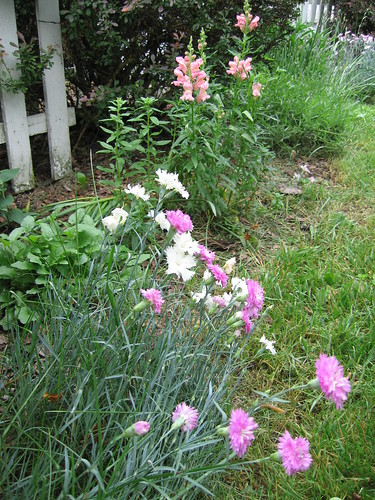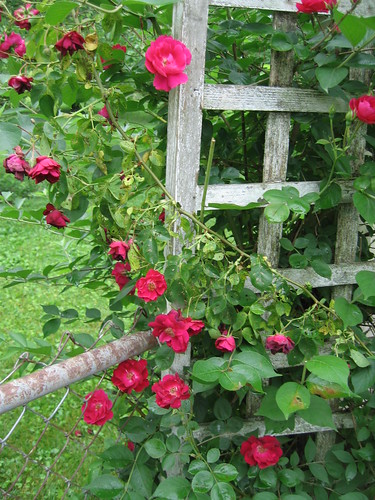 The side-garden today with winter-sown poppies and Sweet William and
The side-garden today with winter-sown poppies and Sweet William andCoreopsis purchased from the farmer's market. None of these plants were here when I moved in.
Read part I and part II of this series
After three seasons of gardening, my garden is finally growing into the lush cottage garden I dreamed of. It's not perfect, nor is it done, but that's part of the fun. I've learned that the biggest skill you need in gardening is patience. You don't have to be an plant expert, or have a huge budget, to have a pretty garden that makes you happy.
I've also learned that some of the serendipitous plantings are the prettiest. The less I baby my garden, the better it seems to do. The garden is finally beginning to fill up, which means lots of fun surprises and blooms each year. I still don't feel like a gardening expert, but I know I don't have to be. And neither do you!
Tips for creating a garden for newbies:
- You don't need to have a perfect plan before you start gardening. If you are a planner, then by all means, plan away! But if not, don't let that stop you from creating your garden. Plants can be moved. It's more important to make sure you're planting something that will grow easily in your area and the planting site.
- You can become knowledgeable about gardening for free. A little gardening knowledge goes a long way when you're starting from scratch, and helps boost your gardening confidence, and you can get it for free! Go to the library, read gardening blogs, visit your local university's extension site, etc.
- Gardening isn't rocket science. Just get out there and try it. Follow planting directions, try compost instead of chemical fertilizer, weed sometimes and then let them go. Sure some of your plants might not make it, but most will. If something dies you can always try again next season. This is easier to do with cheap plants, see above.

- If something doesn't grow in one spot, try again in another.
- Improve your soil. But you don't need to use synthetic fertilizers or other expensive add-ins to do so. Just start a compost pile and add compost before planting and whenever you can. I try to add compost when I plant (some of my beds have more clay than others and need more compost).
- Want cheap plants? Try winter-sowing, direct sow seeds, swap plants with friends and neighbors and learn how to propagate plants.
- Watch for sales. If you're patient, you can find most things you need for your garden on sale, including seeds, potting soil (for winter-sowing), plants, garden tools and more. Those 10 cent seed packs you can find at Walgreen's and other places work just fine. Many of the perennials I bought from garden centers were just 33 cents each. I found lilacs for $5 and a peony for $3.95. If you're patient, you can save a lot. Also check garage sales to find gardening tools on the cheap.
- Some perennials won't do much until the second year, so don't count anything out until you see what comes back next season. And on the third year, watch out, they'll really start to show their stuff!




These are great tips, and will surely give the newbie gardener some good direction. I think experience counts for a lot!
ReplyDeleteYour rose is beautiful along that trellis!